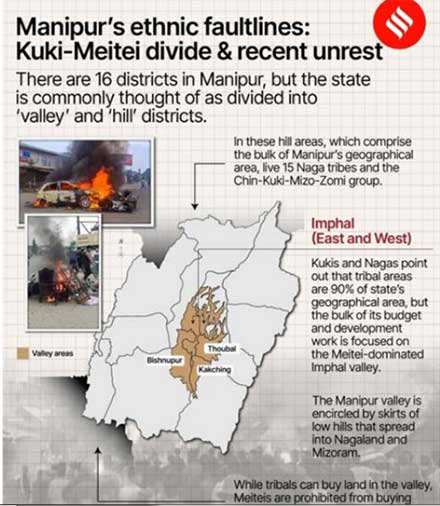Date : 03/06/2023
Relevance : GS Paper 3: Role of state and non-state actors in creating challenges to internal security
Key Words : Tribal administration, Kuki tribe Insurgency, Manipur Ethnic faultline, territorial integrity
Context-
- The Kuki insurgent groups ( United People Front and Kino National Organisation ) which signed a tripartite suspension of operations (SOO) with the Manipur government and the Ministry of Home Affairs (MHA) in 2008 are going to press for a separate administration and equal political status for the Kuki-Zo community, separate from Manipur but within the Union of India.
- The ongoing violence between the Kuki-Zomi tribals and the largely Hindu Meiteis ( over Manipur High Court order to grant ST status to Meiteis ) has fasten demand of a separate administration as the “State miserably failed to protect” them when the violence started on May 3.
Why demand for separate administration and recent conflict ?
The demand for a separate administration and recent conflict by the Kuki tribe in Manipur is rooted in historical, political, and socio-cultural factors.Here are some key reasons behind this demand:
- Historical grievances: The Kuki tribe has experienced historical marginalization and conflicts with other communities in Manipur. Kukis and Nagas point out that tribal areas are 90% of the state's geographical area (Mainly Hilly area ), but the bulk of its budget and development work is focused on the Hindu Meitei-dominated Imphal valley (Valley area ). So the Meitei - Kuki divide is nothing but Hill and Valley divide. At May3, old grievances have been triggered by new developments (Granting ST status to Meitei )
Source: The Indian Express
- Land and territorial disputes: The Kukis have longstanding land and territorial disputes with other communities in Manipur, primarily with the Nagas. They argue that a separate administration would allow them to assert control over their ancestral lands and resolve these disputes.
- Identity and autonomy: The Kuki tribe, an indigenous community in Manipur, seeks to preserve and protect its distinct identity, language, and culture. They believe that a separate administration would grant them greater autonomy and control over their affairs.
- Political representation: The Kukis contend that a separate administration would ensure better political representation and decision-making power within the governance structure. They perceive it as a means to protect their interests and address their community-specific needs to safeguard their unique heritage.
Challenges in front of Government
Providing a separate administration for the Kuki tribe in Manipur state presents several challenges for the government. Here are some key challenges:
- Ethnic tensions: Granting a separate administration to the Kuki tribe may potentially create ethnic and communal tensions within Manipur. Other communities in the state might perceive it as a threat to their own interests, leading to opposition or conflict.
- Integration with the existing governance framework: Ensuring the smooth integration of a separate Kuki administration within the broader governance framework of Manipur would be a complex task. For example On March 10, the Manipur Cabinet decided to withdraw from the tripartite SoO agreement with the Kuki National Army (KNA) and Zomi Revolutionary Army (ZRA), two hill-based insurgent groups.This withdrawal will create a challenge to manage the broader governance framework in Manipur.
- Constitutional considerations: Implementing a separate administration for the Kuki tribe would require constitutional and legal changes, which may involve complex procedures and political consensus.
Constituent Assembly debates on Article 3: Territorial Integrity and Democracy
Shah's Defense of State Rights and Democracy:
K.T. Shah, a proponent of state rights and democracy, voiced his concerns during the Constituent Assembly debates on Article 3. He argued against granting the central government unilateral authority to alter state boundaries without the consent of the affected states. Shah contended that such a provision would not only prejudice the units themselves but also undermine the very foundations of democracy.
Santhanam's Cautionary Perspective:
He cautioned against mandating state consent for boundary changes. He warned that such a requirement could lead to the absolute autocracy of the majority, whereby minority demands for merger with adjacent states or the formation of separate states might be disregarded.
Conclusion
- It is important to note that the demand for a separate administration by the Kuki tribe is a complex and sensitive issue, requiring careful consideration of various perspectives, historical context, and the aspirations of all communities involved.
- The government should follow a multi-pronged approach, combining security measures with socio-economic development, dialogue, and regional cooperation to address the root causes of insurgency and promote peace and stability in the Northeast.
Administrative arrangement to handle insurgency in North East
Constitutional provision:
- Article 244 (1): 5th schedule shall apply to administration of scheduled areas and scheduled tribes.
- Article 244 (2): 6th schedule shall apply to the administration of scheduled areas, in the states of Assam, Meghalaya, Tripura and Mizoram.
- Under Article 371 (C) Manipur has been accorded special status.
Inner Line Permit (ILP):
- Restrictions are imposed on the entry of outsiders to maintain the original identity of indigenous people of Manipur, Mizoram, Nagaland and Arunachal Pradesh.
Ministry of Development of North Eastern Region (DoNER)
- This ministry is working on the matters relating to the planning, execution and monitoring of development schemes and projects in the North Eastern Region, to accelerate the pace of socio-economic development of the region.
Probable Questions for Main Examination:
- Question 1 : North east insurgency is the culmination of various factors. Discuss this statement in the context of the recent Kuki- Meitei Conflict. (10 Marks,150 Words)
- Question 2: Examine the implications of granting a separate administration to the Kuki tribe on Manipur's territorial integrity and the broader multi-ethnic fabric of the state. How can constitutional considerations and the principles of democracy be reconciled in addressing such demands? (15 Marks, 250 Words)
Source : The Hindu







